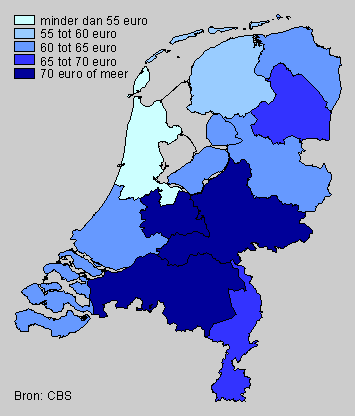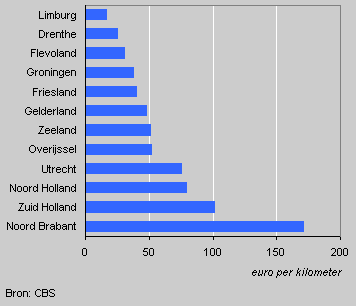Provincial motor vehicle tax up 9 percent

Provincial authorities in the Netherlands will receive more than 1 billion euro in motor vehicle tax in 2005. That is nearly 9 percent more than in 2004.
Provincial motor vehicle tax is the most important source of income for provinces, accounting for around 20 percent.
Increase in motor vehicle tax in all provinces
The growth in revenues from motor vehicle tax is caused by an increase in the number of vehicles, and by an average 3 percent rise in the rate of the tax from 1 April 2005. The latter has not been introduced in North Holland, South Holland and Zeeland, where the rates remain unchanged. Motor vehicle tax puts an average 63 euro per inhabitant in the provincial coffers.
Revenues from motor vehicle tax, 2005 (euro per inhabitant)

Large differences in spending per province
On the other side of the balance sheet is the expenditure by the provincial government. This spending amounts to 4.5 billion euro in 2005. There are relatively large differences in spending between the provinces. Zeeland (with 272 euro per inhabitants) and Friesland (238 euro per inhabitants) spend relatively large amounts, whereas South Holland spends relatively little, with 112 euro per inhabitant.
Provinces mainly spend their money in the area of traffic and transport, with the exception of Limburg where no more than 8 euro per inhabitants is spent on this category.
Provincial spending by policy area, 2005

Highest spending on traffic and transport
Provinces spend an average 62 euro per kilometre on the management and maintenance of provincial roads. North Brabant spends most: 172 euro per kilometre, followed by South Holland (102 euro) and North Holland (80 euro). A few large road improvement projects are being carried out in these provinces: in North Brabant, for example, the N50 is being converted into a motorway (A59) and as the province is a major stakeholder in this, it costs them a lot of money.
Provincial spending on provincial roads, 2005

The provinces Flevoland, Drenthe and Limburg spend substantially less on the management and maintenance of roads.
Lia Siebeling